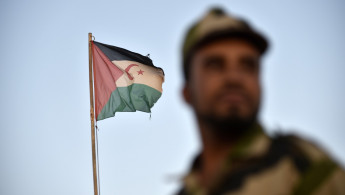Polisario Front condemns Morocco's royal speech on Western Sahara as 'blatant lies'
The Polisario Front, Sahrawis' self-proclaimed government in exile, flagged Sunday the recent Moroccan royal speech as "open fallacies, blatant lies and malicious propaganda," reported Sahara Press Service (SPS), the front's news agency.
On Saturday, in a speech marking the 69th anniversary of "the Revolution of the King and the People", a national holiday celebrating the kingdom's anti-colonial struggle, Morocco's King Mohammed VI called on his country's partners to "clarify" their position over the disputed Western Sahara territory and offer "unequivocal" support.
Morocco's king also described the dispute as a "clear and simple measure for the sincerity of friendships" between Morocco and its partners.
In response, the Polisario Front said Sunday that "the intransigent royal speech" aims to put a new stumbling block in the way of international efforts "to decolonise the last colony in Africa."
The Algeria-backed front also accused Morocco of using the Western Sahara dispute whenever the internal situation in Rabat increases in tension.
"The legal status of Western Sahara is clearly and explicitly defined by all international resolutions which confirm that Western Sahara and the Kingdom of Morocco are separate and distinct countries," added the front's Sunday statement.
The UN formally recognises neither Moroccan nor Polisario Front sovereignty over the disputed territory of Western Sahara.
Morocco fought a 15-year war with the Polisario Front separatist movement after Spain withdrew from its former colony in 1975.
In 1991, the UN established a peacekeeping mission to monitor a ceasefire and organise a referendum on the territory's status.
The vote was set for 1992 but was suspended after Morocco refused to accept any vote that allowed for the territory's independence, saying that only "autonomy" was on the table.
In 2006, Morocco presented its autonomy plan regarding the territory, which is supposed to allow Sahrawis to run their affairs "democratically" through legislative, executive, and judicial bodies, while Rabat retains control over the defence and foreign relations.
For its part, the UN has backed the plan, yet the Polisario Front rejected Rabat's proposal and continues to call for an independent state for Sahrawis.
Since then, numerous UN-sponsored talks have failed to make a breakthrough, each side further entrenched in their positions.
Most Arab countries and a few African states publicly stand with Rabat against the separatist front.
Lately, Rabat has been seeking more Western support to legitimise its control over the territory.
Despite the diplomatic pressure, Germany and Spain abided only in supporting Morocco's "autonomy plan" for the territory while also asserting their support for the Sahraoui people.
In December 2020, the United States became the first and only Western country thus far to support Rabat's total sovereignty over the territory in a brokered deal that convinced Rabat to normalise ties with Israel.





 Follow the Middle East's top stories in English at The New Arab on Google News
Follow the Middle East's top stories in English at The New Arab on Google News


